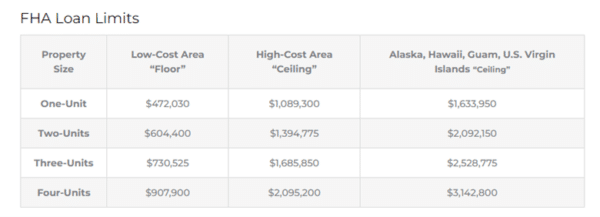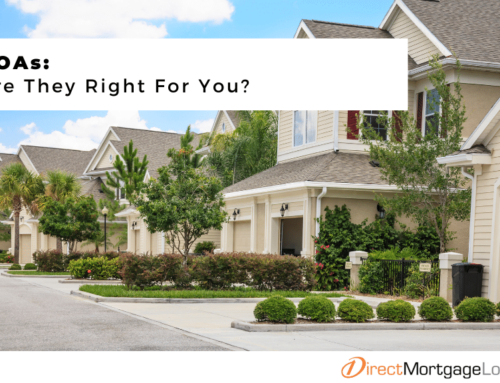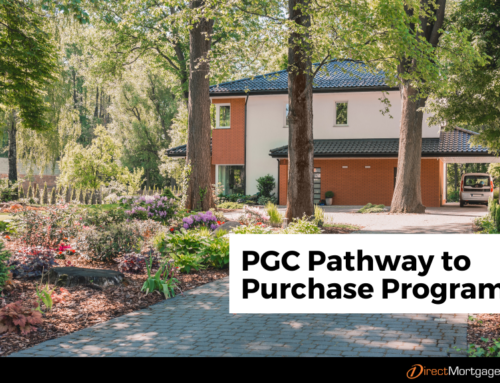What type of loan is best for first-time buyers?
Finding the best home loan may seem overwhelming to many first-time home buyers. Fortunately, there are a variety of options available to first-time home buyers that make homeownership more accessible. Typically, the most popular home loans include- Conventional, FHA, USDA, VA Loans, and Specialty Loans. Here is a breakdown of each type of home loan to get a better sense of which option could be best for you!
Conventional: The conventional loan is a type of conforming loan, meaning that it meets the conventional loan requirements for a Fannie Mae or Freddie Mac loan, though it is not backed by the government. Once viewed as the 20% down mortgage solution, conventional loans are now available to clients with down payment options as low as 3%.
- Range of down payment options: For a first-time home buyer, the minimum down payment may be as low as 3%.
- Mortgage Insurance Flexibility: Unlike government-backed loan options through FHA and USDA, conventional loans offer options for your mortgage insurance. Should you put down 20% or more on your purchase, this is not applicable as mortgage insurance is not required for purchases with 20% down or more. If you put down less than 20%, you can work with your loan officer to determine the mortgage insurance option to best fit your scenario.
- Conventional loans have less restrictive property guidelines compared to other mortgage programs.
- Affordable housing programs offer borrowers the opportunity to purchase a home with a 3% down payment.
USDA: USDA loans are backed through the Rural Housing Division of the United States Department of Agriculture. They are available to millions of eligible primary home buyers with low to moderate incomes, or scarce funds for down payments.
- No Down Payment: Most mortgages require an initial down payment that is paid on closing day. Because of this, many homebuyers say that saving for the down payment was one of the hardest parts of the home buying process. Since USDA loans require no down payment, purchasing a home with a USDA loan program may be advantageous for those with low down payment funds.
- Low Credit Score Requirement: USDA’s programs typically require a 600 minimum credit score, a credit score Direct Mortgage Loans can lend to. However, you may need other compensating factors to offset the lower credit score. Furthermore, the applicant must prove that they are willing and able to repay their home loan.
- Low Origination Fee: Borrowers will pay a guaranteed fee of 1% of the total home loan amount. You can finance this fee into the loan, so you do not have to pay out of pocket.
- USDA Rates: Rates of USDA loans are usually lower than those of typical conventional home loans.
- Property Eligibility: While there are requirements for borrowers to be eligible, the property must also be within a USDA eligible location.
VA: The Department of Veterans Affairs has mortgage programs specifically for military personnel, veterans, and surviving spouses of those who have so valiantly served our country. With a VA loan, there is no monthly mortgage insurance, and because of this, there are substantial savings over the term of the mortgage. Moreover, these types of loans are assumable. This means you can give your loan to someone else if they are eligible for a VA loan.
- 100% Financing With 0% Down: You can finance 100% of the loan with no mortgage insurance. This can save you hundreds of dollars per month compared to a Conventional loan. You can also finance 100% with a cash-out refinance.
- Relaxed Home Eligibility: Home eligibility for a VA loan includes stick-built houses, condominiums, or even manufactured homes.
- No Loan Amount Caps: Currently, there is no cap on loan amounts, so you could use your VA loan for a jumbo loan amount. *
- *As of May 2021. This is dependent on veteran loan entitlement and county loan limits.
Download our FREE VA Home Buyer Guide!
FHA: Governed by the Housing of Urban Development (HUD), FHA loans offer flexible guidelines for borrowers with limited down payment funds and an imperfect credit history. Since FHA loans require lower credit scores and down payments, they are especially popular among first-time home buyers.
- 3.5% down payment
- Flexible use of gift funds and grants for down payments.
- Flexible qualifying credit- it’s possible to qualify with a lower credit score.
- Upfront Mortgage Insurance may be financed or paid at closing.
Specialty Loans: Specialty loans are a type of mortgage personalized to fit the specific needs of the borrower. These home loans are designed to help home buyers with unique or special circumstances that may not qualify for a standard home loan. Here are just a few of the most popular programs that we have to offer:
- Good Neighbor Next Door: The Good Neighbor Next Door loan program offers qualified professionals housing incentives while contributing to community revitalization. By purchasing an eligible property, a qualified home buyer is offered a 50% discount from the listing price of the home.
- Fannie Mae Homeready/ Freddie Mac Home Possible Advantage Loan: Designed for the creditworthy, low-to-moderate income borrower, with limited down payment funds, HomeReady and Home Possible provide home financing options with up to 97% financing, or a down payment as low as 3%.
- Non-QM Loans: Non-QM loans are a type of alternative mortgage loan that is designed for borrowers who do not meet the typical requirements of a conventional loan. These loans are typically used by borrowers who are self-employed, have non-traditional forms of income, have a low credit score, or cannot provide the necessary documentation for a conventional loan.
Is it worth getting an FHA loan?
A FHA Loan is a government-backed mortgage which means it is more accessible to those who may not be in a perfect position to buy. However, it’s important to consider both the advantages and disadvantages associated with this type of loan before deciding if this option is right for you.
FHA Advantages:
- Low Down Payments: As little as 3.5% down will work in most instances, and 5% covers most others.
- Higher Loan Amounts: In some areas, FHA maximums can exceed conventional loan limits.
- Lower Total Cash-to-Close: Sellers can help pay closing costs, and borrowers can receive gift money toward their down payments.
- Streamlined and Cash-Out Refinancing: Subsequent refinancing can be far easier and more lenient than with conventional loans.
- Purchase & Rehab Financing: The FHA 203k loan can be a great option for the purchase of homes needing anything from a quick spruce-up to major remodeling.
FHA Disadvantages
- PMI (Private Mortgage Insurance): Private mortgage insurance (PMI) is not cancelable.
- Not Condo Friendly: Many condominiums do not qualify for an FHA loan.
- Owner-Occupied: FHA loans cannot be used to finance a second home, a rental property, a vacation home, or an investment property.
- Loan Limits: FHA loan limits differ from state to state.
What is the maximum you can borrow on an FHA Loan?
The FHFA sets annual lending limits. The limits vary depending on the county in which you live and the type of property you are purchasing. Areas with a low cost of living set a lower limit called the “floor.” While areas with a higher cost of living have a higher figure, called the “ceiling.”
The Federal Housing Finance Agenecy (FHFA) has set the maximum amount you can borrow to $427,030 in most areas for 2023. For FHA borrowers in high-cost areas, the maximum loan limit for a 1-unit property in a high-cost county is $1,089,300. Special exception loan limits in Alaska, Hawaii, Gaum, and the U.S. Virgin Islands cap single-family home loans at $1,633,950.
What is the easiest house loan to get?
First-time homebuyers typically find FHA loans to be the easiest to qualify for due to their low credit score and low-down payment requirements. However, you may be eligible for a home loan that is even easier to get approved for than an FHA loan depending on your specific situation. For example, USDA loans and VA loans can be easier to qualify for but are only available to certain buyers in certain situations. Access our FREE Home Buyer Guide to learn more about our home financing solutions and the overall process!
How do I qualify for a first-time home buyer’s loan?
The U.S. Department of Housing and Urban Development (HUD) defines a first-time home buyer as an individual who has not had ownership in a principal residence for 3 years ending on the date of purchase of the property. If you are considered a first-time homebuyer, the next step is to complete a pre-approval application. Completing a pre-approval application is a fairly simple process and is based on the following factors:
- Debt-to-income ratio: Your debt-to-income ratio is the percentage of your gross income used to cover your mortgage and other debt payments. This ratio and your credit score are two key factors used to determine if you qualify for a loan. The lower your ratio, the easier it is for you to pay your bills each month.
- Proof of Income: An applicant’s income must be shown to a lender to prove that you can afford to pay back your mortgage every month. Pay stubs, W2s, and tax returns are all ways you can prove your income.
- Proof of Assets: The lender will want to see your assets to ensure you have enough money to pay a down payment on a home. You can do this by providing them with your last few bank statements, though other documents may be needed during the process.
- Credit Score: Lenders will also pull your credit report to see your credit score. If you have a high credit score, lenders will see that you are trustworthy and will be able to make on-time mortgage payments.
- Identification: Lastly, a lender will want to be sure you are who you claim to be. These documents can include your social security card, passport, and driver’s license. A signature indicating that you authorize credit checks will also be required.
Start the pre-approval process today using our DML app!
Which loan is best for first-time home buyers?
When it comes to home loans there is “no -one-size-fits-all” mortgage. First-time home buyers should apply for the loan they are most qualified for. Your loan officer will be able to determine the best loan option for you based on your specific financial situation and home buying goals.
If down payment funds are the challenge holding you back from your home purchase, consider asking your Direct Mortgage Loans Loan Officer about Down Payment Assistance Programs. These programs aid home buyers by providing grants, or loans, to reduce the amount needed for a down payment. In some cases, down payment assistance programs may cover closing costs too. There are specific requirements to be eligible for these programs, and different DPA programs have varying requirements and lenders that they work with.
- Loans: Loans are second mortgages that a borrower will pay back monthly, along with the primary mortgage.
- Grants: Grants are essentially gifted money towards the down payment that never needs to be repaid.
- Deferred Loans: Deferred loans are also second mortgages; however, they have deferred payments. Therefore, this second mortgage must be repaid when the borrower moves, sells, or refinances their home.
- Forgivable Loans: Forgivable loans are second mortgages that are forgiven for many years (anywhere from five to twenty years). This mortgage only gets repaid if you move, sell, or refinance before reaching the period of forgivable time. For example, if you agree to a 5-year forgivable loan, but sell the house during year 3, you will need to repay the down payment assistance amount.
There are over 2,000 DPA programs worldwide. Work with a loan officer to find the right DPA programs for you.
Connect with a Loan Officer To Learn More
Eligibility and approval is subject to completion of an application and verification of home ownership, occupancy, title, income, employment, credit, home value, collateral and underwriting requirements. Direct Mortgage Loans, LLC NMLS ID# is 832799 (www.nmlsconsumeraccess.org). Direct Mortgage Loans, LLC office is located at 11011 McCormick Rd Suite 400 Hunt Valley, MD 21031. Equal housing lender.







Leave A Comment
You must be logged in to post a comment.